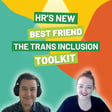Introduction: Elle and Kly Scott on Gender Focus
00:00:02
Speaker
This is Gender in Focus. I'm El and each week I sit down with the president of Trans Focus Consulting and all-round gender diversity genius, Kai Scott. I get to ask all the questions you've ever wanted to ask about how to make the workplace and the world a better place for trans and non-binary people.
00:00:20
Speaker
Let's get into it.
Challenges in Correcting Trans Issues
00:00:23
Speaker
In today's episode, we are exploring when and how to correct other people's mistakes. Many people are great at noticing and correcting their own mistakes with trans and non-binary people.
00:00:35
Speaker
But when it comes to ah correcting other people's mistakes, that's where we get a little uncomfortable. Some people don't want to rock the boat. Others are unsure if a mistake has been made.
00:00:46
Speaker
And then there's the concern about who am I to tell someone what to do or say. Some people are worried about coming across as superior or know-it-alls, especially at work.
00:00:57
Speaker
I get all of these concerns and share them as I'm an ally on other equity issues. So let's unpack these important dynamics and opportunities for helping one another grow together.
00:01:09
Speaker
And I'm excited ah to be joined by my colleague, El to help us unpack these issues. So it's it can be really awkward when you're trying your best to to be an ally to trans and non-binary people and get things right yourself. And then you see somebody or you witness somebody making a mistake right in front of you and you kind of don't know what you need to do about
Respecting Comfort in Corrections
00:01:31
Speaker
that. um So can i ask you just to begin with, what what do we do? What's the kind of first things we should be doing or thinking about when we witness a mistake that somebody else makes?
00:01:41
Speaker
Yes, I can so relate that kind of deer in headlights moment of like, I heard somebody make a mistake and now perhaps I need to take action. And what kind of action? How, when, where, what?
00:01:53
Speaker
ah Like, and it's racing through the mind kind of in a split second. And certainly, as I mentioned, I appreciate those those feelings. um And it's really important, of course, to look at what's happening. You know, we don't want to rush into things ah Say, for example, if a trans person is present and the mistake has been made, kind of if you've already talked to them about it and then doing what you agreed upon, or just a split second look at them if you haven't talked to them to see if they're going to do anything.
00:02:24
Speaker
ah And then thinking about those dynamics, especially if there's, say, a power differential between the two ah folks involved. ah ah But if a trans person isn't present, then looking at who else is in the room, if it's just one-on-one, it's actually really simple.
00:02:43
Speaker
It's just like, are you talking about Drew? Oh, I think you meant they, them pronouns as an example of a quick correction. ah And so that's probably the simplest ah situation that you could be in that is actually fairly straightforward.
00:02:58
Speaker
If it's within a group with or with the trans person, I would look at it more carefully. And if you see, for example, the trans person is nervous or hesitating, ah then kind of respecting that maybe this is not the greatest moment to be introducing it.
00:03:15
Speaker
Or if a meeting is really heated and we're struggling on another topic and inserting a correction is just going to add more fuel to the fire that already exists, right?
00:03:26
Speaker
So you just want to be aware of what's already happening before jumping in and correcting other people. If um it's not the right moment, there's always the ability to loop back to folks to say, hey,
00:03:37
Speaker
you know, in an hour, a day later to say, hey, you know, yesterday you might not have noticed, but you know, you misnamed so-and-so. And so I just thought I'd let you know. um And then you can also offer to practice with that person if they seem to be struggling.
00:03:53
Speaker
So it's not coming from a blaming or shaming perspective. It's more just a supportive aid to that person. Can you go into a bit, you you have just talked about it, but can you go into it a bit more about um addressing the mistakes when they're in front of somebody, like in front of a group, as opposed to in private, and like how you can, what what the differences are in in terms of how you need to address that?
Building Rapport and Prearranged Agreements
00:04:18
Speaker
Yes, that's a really important thing because certainly within a group, people can be very can receive that information in a way that is they're very self-conscious by the mistake that they've made and can kind of further kind of shut them down.
00:04:36
Speaker
ah But there are ways that you can do that. It depends on the rapport you have with that person. If you're really close, then you interjecting to to just correct them very quickly and and simply um probably doesn't even register as anything.
00:04:51
Speaker
It's like, oh my gosh, thank you. I really appreciate that correction. um And in ways to do it is just to say, oh excuse me, ah just really quickly, I wanted to jump in.
00:05:01
Speaker
i heard you say this, but it's actually this, right? um And so just making that correction. ah Because most often people don't realize what they're saying because we're talking so quickly that and on a topic on another topic and people are just really focused on that topic rather than what they've just said about another person.
00:05:21
Speaker
So you're another set of of ears or eyes in that case ah to understand. reflect back to them what they've said to allow them for that um growth in their way of speaking about that person.
00:05:37
Speaker
um So it is very helpful to do that. ah A quick, you know, my excuse me, you know, very cordially and and supportively to to interrupt. ah But I would say that if you haven't, especially if that if a trans person is there and you haven't talked about it, to say, hey, had a sidebar conversation with the trans person to say, hey, if anybody misgenders you in a group setting, um I'm happy to jump in to help out or how would you like to handle the situation?
00:06:08
Speaker
You want to have that kind of prearranged ah game plan, if you will, ah to know what to do in that case. Because otherwise, you might be kind of stepping on their toes ah because they may want to handle it in a very different way from how you imagine it.
00:06:23
Speaker
So just want to get on the same page before that happens. So that's why there's a few different variables to ah correcting other folks with or without the person, trans person, and um in a group or one-on-one.
00:06:36
Speaker
Mm-hmm. I think we've all probably been in situations, whether it's ourselves or with people we are with, where defensiveness is the first kind of reaction to to a correction or or something similar.
Reducing Defensiveness: Sharing Learning Experiences
00:06:52
Speaker
How would you go about reducing the the risk? I mean, you can never know 100% how someone's going to react, but if you were to try and reach that person in a way that reduces defensiveness, how would you go about that or how would you suggest to go? Mm-hmm.
00:07:07
Speaker
yeah it's ah Yeah, defensiveness is ah is ah is an issue. There are folks for whom it's um it it can even be very mild where people want to explain why they did something ah to kind of cover over or ah smooth it over for themselves. They want to kind of plot how did this happen and then verbalize that to other folks.
00:07:34
Speaker
And then there are also folks that could be on the more extreme side of defensiveness, like, this is all made up. I don't but like i don't need to do this. So yeah you could have quite a range there of people reacting to being corrected.
00:07:49
Speaker
um And in order to reduce it, I typically ah come as a fellow learner. So I don't position myself as like knowing everything and just like I, you know, either referencing a course that you took or, um you know, saying, you know, I made this mistake just last week, right? Or just something where you're able to connect with that person to show that you're in it together rather than,
00:08:16
Speaker
you're, you know, kind of admonishing them for having misstepped. ah It's more that, no, i i I'm so glad that, you know, others have noticed and told me, and now I'm giving that to to you as well, because we actually need to approach it in terms of a team, rather than, you know, handling on our own and hoping that, you know, we'll move forward, which, of course, you can move forward on your own, doesn't require people.
00:08:42
Speaker
ah But certainly, it is much easier if you know, we're all paying attention ah to ourselves first, and then to others to help them out as well. Can I just go back to something that you said earlier, um around ah referring to or checking in with the trans person that the mistake has been made about?
Trans Individuals' Agency in Corrections
00:09:02
Speaker
um And could you just touch on that kind of creating agency and ensuring that you're not overstepping ah what what maybe they would want?
00:09:12
Speaker
Yeah, yeah, it's ah it's a big one and people may not realize that that's at play, that within transs and non-binary communities, there's quite a range of different approaches to correcting others, especially at work where, you know, their job is at play and they might have different approaches to how to address issues that come up.
00:09:36
Speaker
and how they wanna enlist others, if at all, ah to help them with that. Some are very um cautious in their approach and would wanna handle things on their own entirely and not have the help of others.
00:09:51
Speaker
And that may seem odd because you know people really wanna help, which I think is such a lovely thing, ah but it's not always welcome in every respect, especially if say somebody is on a probationary period maybe they don't want to address any issues. And it's hard probably hard to um respect that because you see somebody in harm's way and and we want to kind of rush in and champion them, which I think is a good and inclination.
00:10:21
Speaker
um but also respecting that people have made it a particular choice for a particular set of reasons, ah some of them that might not be visible to us. ah There's a lot of different dynamics and issues bubbling up outside of work as well, ah that people are making a very careful calculus right now, um one that we may not really fully understand.
00:10:46
Speaker
um And we don't have to understand to respect those decisions. So that's kind of the cautious side. And then others are exhausted and would love the help of others and are just like, I don't want to correct another person. This is, I'm tired, especially for folks who say are non-binary, have gender neutral pronouns, and that are frequently misgendered.
00:11:09
Speaker
ah They can be exhausted, not to say all of them, but certainly many. And so ah understandable that they would want to have the help of other folks. um And that's why it's so good to come together to talk about that, um to see where people are at to then take action or not based on what was discussed.
00:11:29
Speaker
Or maybe there's a particular signal that you send each other when you know you're supposed to help. And then other times when the trans or non-binary person wants to handle it themselves. So But you're right, that agency piece is really important because ah often things are done to trans people, particularly in this day and age, a lot of harmful stuff.
00:11:53
Speaker
ah So that that that can sometimes show up even in people wanting to help, ah can overstep and kind of get into ah some self-determination that should should lie with the trans person.
00:12:10
Speaker
So it just takes a few extra steps. It's actually not that much extra work to determine you know where somebody is at and how you could ah be involved in helping them if they want that.
00:12:22
Speaker
I think that's so it's such a it kind of goes against what we think to do. Often people really feel the need to leap in immediately. But actually, that could be the least kind thing you can do.
00:12:36
Speaker
and and the least supportive thing you can do. So I think that's a really interesting Well, and also trans people, it it might not land for them, but trans people have been through a lot and know how to, there's a bit of a, ah sometimes a chess game and they've played out some of these steps and they, it may backfire for the other person involved as well.
00:13:00
Speaker
So, and that, that most of that cost is then borne by the trans person. So not only do they not have the agency, but they also experienced the backlash. So it's it's really quite complex and so that's why it's really important to honour whatever calculus a trans person has plotted through. That makes sense.
00:13:24
Speaker
Can I ask you, um a lot of like what we've been talking about at the moment has just been about accidental mistakes, but one what does that look like if the mistake is a deliberate choice by but someone?
Intentional vs. Accidental Mistakes
00:13:38
Speaker
Ooh, yeah, intentional mistakes versus accidental that people didn't intend to make ah but did by virtue of maybe not as much practice or being relatively new for somebody.
00:13:49
Speaker
But yeah, the intentional mistakes are very harmful. Those, of course, they land differently based on the person, but um certainly in the court cases that have come through here in Canada, there have been about five or so cases recently and since 2021. And very explicitly spell out that judges always rule in favor of trans and non-binary folks in that intentional mistakes. So knowing a pronoun or knowing a first name and refusing to use it
00:14:25
Speaker
And that is considered discriminatory. It's really clearly spelled out and is quite a serious matter that does require ah intervention and support.
00:14:36
Speaker
ah Now, again, it's working with the the trans and non-binary person, um especially among leaders. It's really important to figure out what that intervention is ah in collaboration with the trans and non-binary person so that it doesn't create further backlash against them.
00:14:55
Speaker
But it is a serious matter, one that is Usually not something that can be just easily resolved between the two people by talking to each other, you know. So that's why there is a bit more of ah a serious matter and a collaborative approach with leadership, whether it's a manager, supervisor, human resources.
00:15:18
Speaker
And so if that is something that a trans and non-binary person is experiencing, it is important to let others know in the organization and maybe even you know show some of the case law to help them understand if they don't already that this is a serious matter.
00:15:35
Speaker
um And then also for the leaders to know that they need to to be able to have those conversations ah once they've talked to the trans and non-binary person, then to talk to the person.
00:15:48
Speaker
And there are all are alternatives, that's the thing. It's not like a binary of not using pronouns and using pronouns, right? There are ways that, you know, if for whatever the reasons are for refusing, ah people can use, instead of a pronoun, can use somebody's first name only.
00:16:08
Speaker
ah rather than shortcutting to a pronoun, right? So, you know, it's not, there are many different options that can be ah offered to somebody who is in that position of refusing as a way to make ah the workplace a better place.
00:16:27
Speaker
You mentioned a bit earlier about um somebody, you know, maybe in a probationary period or having an issue with a sort of power dynamic.
Correcting Leaders and Peer Approaches
00:16:38
Speaker
do we correct leaders in an organization? Because it takes a little bit more thought around that rather than just sort of peer to peer. So could you could you go into that?
00:16:49
Speaker
Yes, absolutely. So if thinking about it from the perspective of the trans person that, you know, or even an ally who is going to maybe, yeah you've talked to the trans person, and and they've agreed that they want your help as an ally and to correct leaders.
00:17:09
Speaker
So in the moment that it's happening, I find that leaders, depending on, of course, who they are, ah may not be ready to hear corrections.
00:17:21
Speaker
And so I find the after the fact looping back to the leader And just saying you may not have noticed, right? So it's not kind of saying that you did this with any harm or malice.
00:17:33
Speaker
It's just might not be on your radar. But this is happening either quite a bit, or if you can speak to the frequency, that can help them too. ah So it's providing feedback to them.
00:17:44
Speaker
ah Now, i I can appreciate as an ally if you're you know not at the level of that leader, or if we're talking getting into the executive level of an organization, if there's a huge hierarchy, like that might feel inaccessible.
00:17:59
Speaker
In which case I would then advise, to connect with a lower level leader to then have them relay that information. Because oftentimes peer-to-peer or just a little bit higher up the chain ah can help with that discussion and perhaps even make it a broader issue than just that individual.
00:18:19
Speaker
saying, hey, we we say we're an inclusive organization, and yet this is happening, and we we we want to be motivated to help anybody that comes through the door.
00:18:30
Speaker
We want to be able to retain employees um and make them feel comfortable, welcome, supported, etc so they may be able to position that ah from a much broader perspective in a way that lands with that executive or that leader.
00:18:46
Speaker
So that can be valuable if you don't feel safe yourself doing that as a perhaps lower level, ah maybe frontline worker ally, ah so But taking on that labor, ah rather than having the trans person need to do that, can actually be a huge piece of allyship, right?
00:19:04
Speaker
I think sometimes people think, well, I'm just, you know, delegating it or handing it off to somebody else. But... you've just saved that trans or non-binary person extra emotional labor of trying to figure out how to say it, when to say it, what to, you know, like all that calculus. so yeah um So that's a really important piece of allyship, even if you're handing it off to somebody else to do that conversation itself.
00:19:29
Speaker
Mm-hmm. What are your thoughts on the the dynamic between intention versus impact when it comes to mistakes, not just correcting other people's mistakes, but also, I suppose, your own mistakes too?
00:19:41
Speaker
Yeah, it's a really interesting one. i have There's a lot to say on this topic and perhaps we can have one episode that just explores that. I know that some people um can say that it's only about impact, right? How it lands for for the trans or non-binary person, that should be the only focus. And if it's harmful, then it doesn't matter the intention.
00:20:05
Speaker
It's just a bad thing, right? I can appreciate that perspective. I don't share it myself. ah For a lot of the research that we've done, we've actually heard something a little bit different, that um a lot of trans and non-binary folks can get a sense of somebody's intention.
00:20:23
Speaker
um If they're trying hard, you know, they're genuinely apologizing and correcting, they're making an effort, ah you know, they care about the individual, you know, by asking and and being a part of their life, etc.
00:20:37
Speaker
So, people can tell, ah usually, and and know of course not everybody. ah so the the intention is actually really important, um even if there are quite a few mistakes, especially perhaps in the beginning phases of learning a new name, new pronoun, or perhaps practicing a pronoun that's unfamiliar to somebody, ah like they, them, or singular use of they, them.
00:21:03
Speaker
So ah a lot of trans people are looking for good intentions, and can manage some of the impacts while people are getting up to speed um versus somebody who is like, nah, I think you're out to lunch. This is woke, you know, that sort of thing. Like that's a non-starter, right?
00:21:27
Speaker
um And that actually increases the harm of what's happening. So misgendering looks very different if somebody is like just being meet like really mean and awful versus somebody really trying and you know trying to get up to speed know as quickly as possible.
00:21:45
Speaker
So I think, you know of course, it's a blend between the two. There's still an impact, especially if if it's quite frequent, and we want to reduce that frequency as quickly as possible.
00:21:57
Speaker
um But there is something to be said about a positive intention and trans and non-binary people being able to either intuitively know that and see that or you know hear that from the other person and now I will say when it comes to and we've talked about this before but when correcting one's own mistake it is important not to go on and on because sometimes people want to convey their like shout their positive intention from the roof you know that was my approach for so long so yeah I get that so much
00:22:33
Speaker
And I get it. they I too, on other issues, want people to understand I'm coming from a good place. But I think we can rest in our own confidence of knowing our good intentions. And, you know, maybe here and there, show them a bit. But um we don't have to be cold.
00:22:49
Speaker
But... But certainly, you know not going on is a really important thing because otherwise, ah you know it's a bit overdone it's too much for a trans person to handle.
00:23:03
Speaker
And they don't need to know so explicitly every time a mistake is made. that there are good intentions. even Even more so, I have some people um who meet a trans person for the first time and then will be like, I'm going to make a lot of mistakes and I hope you know that I'm coming from a good place. Like you don't have to preempt either.
00:23:24
Speaker
ah so there's a few things that people do where it's just like, yeah, ah ah how about we just you know proceed and see how it goes and so and people make the effort, a good faith effort, right?
00:23:37
Speaker
So... We're obviously looking at this from the perspective of um trans and non-binary issues, but this is something that everyone can relate to,
Broadening Correction Tactics to Other Groups
00:23:48
Speaker
to some degree. So if you're trans and non-binary, ah you'll also experience this for other equity seeking groups, right? So um how do you navigate that when you're kind of understanding when to jump in or how to jump in with other issues?
00:24:04
Speaker
Yes. So I tend to, I mean, if it's one-on-one with a person, i you know, maybe somebody said something and I'm, whoa, that's different or way um way off of what I understand, right? Or I know of a community.
00:24:23
Speaker
And this happens a lot, say, with Indigenous issues, ah because we unfortunately in our school system don't talk a lot about or know a lot about beyond, you know, some of the like really high level, you know, 60s scoop ah residential school, etc.
00:24:41
Speaker
a People just have very little understanding and will say things where I'm like, oh wow, no. ah But I try not to be like, you're wrong and like finger wag and um kind of blame them because you know really it's it's a function of a lot of things, you know school being one of them, but you know racism against indigenous folks and kind of holding back of information, ah lack of connection between various communities.
00:25:12
Speaker
So rather than that, I come with curiosity like, oh, you know can you tell me more about that? What do you mean? What about this? um Have you heard about this? you know like I try to engage them in a dialogue, which fair enough, you know depends on which setting, how much time you have to go into that.
00:25:31
Speaker
ah To be like, if you don't have a lot of time, just to be like, that's not my understanding of the issues. And have... you know i have these experiences if you do have a lot of knowledge or if you don't have a lot of knowledge to say, hey, I'm i'm not so sure on this, but I don't think that's the case.
00:25:50
Speaker
Can we come together another time to talk through this a little bit more? um you know So there's different ways to do it based on how much time you have. But if you do have time, I do recommend ah ah kind of a quiet, calm conversation.
00:26:05
Speaker
Now, I can appreciate that depending on what topic it is and how far off somebody is of what they're saying, it can personally trigger somebody. like I've been triggered in conversations on other equity topics where I'm like, you know what, I'm not really productive right now in this conversation, but I want to continue the dialogue.
00:26:29
Speaker
So it's just kind of putting a pin in it um and being honest because sometimes my capacity is stretched. Maybe I've done you know two education sessions that day and I'm maxed out on talking about really complex issues and unpacking them with folks.
00:26:47
Speaker
And that's okay, that's fair, right? And so it's just knowing where you're at, um how much you have capacity for a topic, ah how much time you have, and you know how you want to handle it, maybe even how close you are with that person.
00:27:00
Speaker
um And so with all of those variables, I do suggest a ah conversation. that that allows that unpacking. Because usually people get stuck at different parts, um you know, based on their own history or their own experiences and don't realize the many layers that exist.
00:27:23
Speaker
And maybe there's a kernel of truth of what they're saying, and I like to acknowledge that kernel, but then pivot to the broader, more complex reality ah that they may not be on their radar.
00:27:36
Speaker
And then sending resources afterwards to help them continue that learning. And maybe even, depending on how big the comment was, circling back a few times. It might not just be a one and done.
00:27:49
Speaker
I really love what you just said about... ah kind of acknowledging and owning when you're not in the place to actually receive the information that you're um being told.
00:28:01
Speaker
And it's that kind of going back to that defensiveness and knowing when you can feel the defensiveness coming up and actually just being like this, I'm for whatever reason, not in the space to hear this right now, but but i it is important and I want to come back to it.
00:28:17
Speaker
I think that's such a beautiful way to handle that because defensiveness is so important. Like, it's so normal for me when I'm getting defensive, I'm very stubborn. So soon as soon as the stubbornness is clicking in, I'm like, okay, I'm not i'm not hearing you. So I need to take a break.
00:28:31
Speaker
ah And I think kind of being able to acknowledge that is so important. Yeah, absolutely. Knowing when you've reached your capacity. Yeah. And in what you're describing too, knowing what tips you off that you're headed in that direction, right?
00:28:48
Speaker
The like stubbornness and like, you know, locking in on your your point or your your part. For me, it's i my my heart rate just increases like, and then I get flushed cheeks, right?
00:29:00
Speaker
And I could barely even hear like you, that person, right? and um And I kind of like, and stumble with my words, you know, so there's just everybody has their own way of knowing, oh, I'm headed into low capacity state, right?
00:29:19
Speaker
And rather than like, running into that ah wall, it's just being honest in the moment. And I find more often than not that the other person is very receptive to that to be like, oh, yeah, I i get it, right? It's not like they're like, no, we must talk about this now. Right. So it just it brings it down. And then when the conversation revisited, actually everybody is in a better place ah to say, yeah, I might have overstated that. Or I realized that that was a bit edgy or hadn't thought it through entirely.
00:29:54
Speaker
I just was echoing what I heard in a video clip. Right. And I don't actually believe that. Right. and So it's just like being able to talk it through is really helpful brilliant. It doesn't solve everything, obviously. Some people have very deeply held beliefs that are hard to pivot ah to more complex realities.
00:30:16
Speaker
ah But still, the conversations are worth it. And maybe it's more long-term connection ah that allows for that long-term shift.
00:30:27
Speaker
Do you have any final thoughts on this before we wrap
00:30:33
Speaker
Yeah, with ah correcting other people's mistakes, there's a lot to it,
Reframing Corrections as Connections
00:30:38
Speaker
right? It's not a simple script. I think a lot of folks want a script like, okay, just tell me what to say and do. And and in every possible scenario, um it might be like me when I was growing up in Germany, I would try to script out all my phone calls and ah to anticipate what was going to be said, but it's just not possible.
00:30:59
Speaker
We're dynamic human beings. We have very complex histories and understandings, and and yet it's still worth connecting over these things. And rather than thinking of correction as this wagging one's finger or ah being a know-it-all, it's actually about connection and furthering and deepening one's relationship with that person, whether it's a professional relationship, friendship, you know, all the different types of relationships.
00:31:28
Speaker
um that help helps take off some of that edge and also allows um like a more heart-centered approach to people. um And it helps us distinguish between things that we've called ah calling out versus calling in.
00:31:46
Speaker
um i don't even think of it as calling so much as just let's talk about it, right? um And it doesn't mean that the other ah person raising the issue needs to know everything either, because I think that's also a bit of a myth, ah really is just saying, that doesn't sound right to me, um and and let's talk about it, and hopefully come up with some way where we both know more at the end and have further deepened our relationship because of that.
00:32:22
Speaker
Yay. I mean, that's the hope. I mean, of course, it can also be messy and that's okay too. But um um yeah, hopefully ways to shift because I think if we just think of it as this punitive thing, which oftentimes...
00:32:39
Speaker
correcting mistakes has been done that way. And people have been hurt by mistake correcting, you know, on other topics. So um maybe there's a way to shift to help that be a different thing and more about growing.
00:32:55
Speaker
What a nice note to end on. Yay.
Kai's Resources and Social Media
00:33:00
Speaker
Where can we find you, Kai, on social media? Ah, yes. Correcting everybody thoroughly. yes Yeah, yeah.
00:33:08
Speaker
LinkedIn, Facebook, Instagram, TikTok, Threads. And then there's also the newsletter, which I highly recommend, not just because we write it, but also because It's a way to continue the learning.
00:33:23
Speaker
We always have some sort of resource that we're sharing or free session that's offered. ah So it's well worth your your time along with you know a short snippet of the blog every month.
00:33:35
Speaker
So it's well worth your time and energy and um yeah, hope to see you there. I also invite you to look at our new quiz that we have on our website.
00:33:46
Speaker
ah There's two different versions. One, if you're and or like representative an organization, want to understand the structural things that you can change within an organization to be more inclusive of trans and non-binary folks.
00:34:01
Speaker
or if you're an individual that wants to understand what kind of ally you are, ah we have different categories of allyship and also corresponding resources that we'll give you ah based on what type of ally you are. And then you can always come back and take the quiz again, see how you're improving, and um perhaps get new resources. We have four different categories there, so it's well It's kind of fun and interesting.
00:34:29
Speaker
Typically, people like to know what kind of type one is on any topic. So I invite you to check that out on our landing page at transfocus.ca. Cool. Thank you so much, Kai. Thank you. See you later.




















